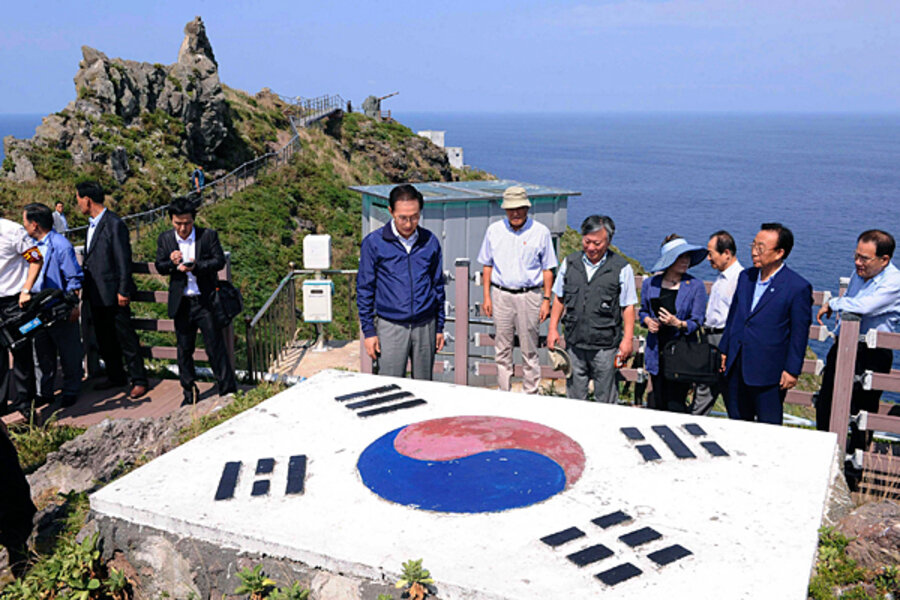Why Japan is angry over South Korea's visit to an island
Loading...
| Seoul, South Korea
South Korean President Lee Myung-bak has sparked a diplomatic rift with Tokyo after visiting a pair of disputed islets.
The rocks located in the Sea of Japan, or East Sea, are known as Dokdo in Korean and Takeshima in Japanese. Both nations assert sovereignty over the rocky outcrops, but observers say President Lee’s trip there on Friday is Seoul’s strongest rebuke yet to Japan’s territorial claim.
“President Lee’s visit is a departure from his old way of dealing with Dokdo,” says Moon Chung-in, a political science lecturer at Seoul’s Yonsei University. “In the past, the South Korean government pursued quiet diplomacy. But apparently, President Lee Myung-bak came to realize this is not working.”
The reaction from Tokyo was swift. Foreign Minister Koichiro Gemba called Lee’s visit “utterly unacceptable” and announced that Japan’s ambassador to Seoul had been temporarily recalled.
The islets were left out of the 1951 Treaty of San Francisco that ended World War II and officially returned territory to Korea from Japan after its colonization of the entire peninsula from 1910-1945. Since that time, South Korea has stationed a small coast guard unit on one of the islets.
Waters around the rocks are rich with marine life and the seabed is reported to be rife with untapped gas and other natural resources.
The territorial dispute is a sticking point in bilateral relations and has frequently led to very vocal demonstrations outside the Japanese Embassy in Seoul. A recent defense department white paper released by Tokyo reiterated its claim to Takeshima, which many South Koreans see as proof that Japan is unrepentant for its colonization.
Throughout his term in office, Lee has favored bolstering economic ties with Japan rather than dwelling on unresolved issues of the past. But Yonsei University’s Mr. Moon says given the lame-duck president’s unpopularity, sticking it to Japan was the politically beneficial decision to make.
“This kind of political gesture can improve his approval rating at home. Legacy politics might be one important factor in driving his decision to pay a visit to Dokdo. Lee Myung-bak was pushed by Japanese politicians to take this hard line position.”
But if relations between Japan and South Korea are harmed by Lee’s visit to the islets, the blame should ultimately fall on Tokyo, says Robert Dujarric, director of the Institute of Contemporary Asian Studies at Temple University’s Tokyo campus.
“This is clearly a Korean island, it has effective control. The Japanese government is very blind to the historical, psychological background to this,” he says. Korea has a small coast guard presence on the islands since 1954, but Lee is the first South Korean president to visit. In 2008 the then prime minister made a visit, which also sparked a diplomatic spat with Japan.
Dujarric adds that the impact of this latest incident will fade away in short time. But if Tokyo continues to cave into to Japan’s minority of far-right politicians, the dispute will continue to escalate.
“This nationalistic crowd has not had much to do since the end of the cold war. The leadership of both the LDP [Liberal Democratic Party] and the DPJ [Democratic Justice Party] have been too incompetent to put their foot down. The last thing Japan needs is worse relations with South Korea,” he says.







